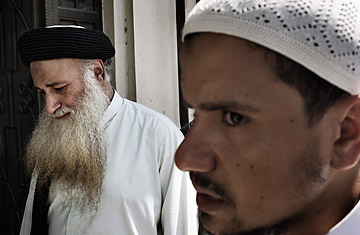
Mohamed Abdel Rahim al-Sharkawy spent 17 years behind bars in Egypt after being extradited from Pakistan in 1994. The fundamentalist Islamist was released from prison in March after numerous appeals from his family claiming his innocence.
(5 of 5)
The country's temporary military rulers, the Supreme Council of the Armed Forces, promised in February that it would lift the emergency law before elections expected this September, but Bahgat says there has been no indication that the promise will be kept. Instead, there are men who continue to waste away in their 30th year behind bars without charges. Policemen accused of torture and murder remain at their posts — including those who are pending trial. And the bulk of emergency law dirty work may have simply drifted from the Interior Ministry — increasingly under fire from protesters — to the military, which has sent more than 10,000 people to closed military courts in the past five months.
Bahgat hopes to use Sharkawy's case to highlight a system that desperately needs reform. "The Ministry of the Interior and all of its different police forces were the backbone of the Mubarak regime, so the focus on security sector reform is on the one hand motivated by the desire to prevent the return of old practices," says Bahgat. "But it's the only guarantee that the transition to democracy will succeed. Because if left unreformed, the Interior Ministry could single-handedly undermine the entire transitional process." Just as it did Sharkawy's life.
For Sharkawy, the years of abuse have had an impact on his identity. He considers himself more of a Pakistani than an Egyptian. And soon, he may return to Pakistan. On May 25, two days before U.S. Secretary of State Hillary Clinton visited Pakistan to reaffirm continued U.S. ties to the state following the falling out over the U.S. killing of Osama Bin Laden, one of Sharkawy's Pakistani sons disappeared. Abdallah, 22, had gone out to buy a drink in the evening and never came back. Four days later, his younger brother Ibrahim, 17, vanished from the family's neighborhood in Attock, when he went to buy eggs for breakfast.
In the wake of Bin Laden's death, the family is certain that ISI and the war on terror is behind their misery once again. "I'll tell you something," says Abdel Rahman. "In the first war against the Soviets, many Arabs went there to fight. But they settled there and they have nothing to do with what's happening now. Their children were raised there and they were having their normal lives, like us. We never went to Afghanistan at the time of the Taliban. We were finishing our studies."
Abdel Rahman is far angrier than his father. "I'm sure the Pakistanis are trying to prove to the Americans that they are doing their best to hunt al-Qaeda by arresting innocent people and letting the masterminds move away." A young man of Syrian descent was arrested in Attock the same week that Abdel Rahman's brothers disappeared. He accuses the Pakistanis of "playing cards" with their allies and foes.
There has been some good news. Last week, after a well-publicized campaign by Pakistani human rights organizations and the Sharkawy family, Ibrahim was released. Pakistani intelligence still says it has no knowledge of Abdallah's whereabouts. The government, which accuses Sharkawy's sons of being in the country illegally (though they are citizens), suggests he fled Pakistan.
So two months after securing his freedom, Sharkawy is thinking about going back to South Asia. "He's going there to see why they arrested his son. But they will use this to sell him to the Americans," says Abdel Rahman, frustrated and worried about his father's safety. "That's what I've been telling my father, but he won't listen."
It's almost midnight and the street below their shadowy apartment still clangs with noise. Sharkawy knows his son is right about the risk, but he resists: "I've been in jail since 1994. That's before 9/11. What could I have done?"
